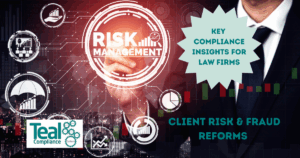Leveraging compliance legal tech enables lawyers to get on with doing what they do best. It should be considered a partnership, with technology doing some of the heavy lifting involved in the daily administrative tasks that eat into lawyers’ billable hours.
Although many advancements have been made in recent years, there are still challenges that are faced by law firms when adopting compliance legal tech.
How has law firms’ appetite for legal tech changed since the pandemic?
Of course, the pandemic expedited many law firms’ plans to digitise the operations side of their practice. They had to find legal tech solutions overnight, such as digital postroom services, AML, KYC, and digital onboarding solutions, to enable their business to move to a ‘working from home’ environment.
As a result, legal tech solutions were implemented with an urgency bias, so their appetite for tech was based on survival. It wasn’t necessarily about solving the problems they already had, it was about finding a way for firms to continue with as little interruption as possible.
The legal tech implemented at the time was able to fulfil that need. However, what many firms are now left with is a number of digitised processes that often don’t speak to each other, and all need to be managed individually. This can be extremely time-consuming and complex.
Therefore, the appetite law firms have for compliance legal tech has now changed. They were able to see how the legal tech worked for them during the pandemic in order for them to survive, and they’re now looking at it strategically. They want consolidation, and to build a future-proofed data and application ecosystem that’s incredibly strong.
With teams now working differently – some working hybrid, some working from home, and some full-time in the office – law firms need to make sure there’s a collaborative tool so everyone can keep their fingers on the pulse.
How has legal tech changed consumers’ expectations since the pandemic?
You’ll no doubt have read stories in the early days of the pandemic about people meeting in car parks to sign deeds over a car bonnet. In the digital world we were living in, this didn’t provide clients with a positive legal experience.
As law firms adapted to the pandemic by implementing new legal tech, clients were able to see how legal tasks could be done immediately and recognised the significant benefits. This has obviously increased consumers’ expectations of tech within the legal sector.
Consumers’ increased expectations have given rise to suppliers and other organisations within the legal sector to look at improving processes through legal tech. With more refined legal tech being implemented, the challenge law firms have now is how to link all these processes together effectively and make compliance processes seamless for their lawyers, and also their clients.
There are already some systems that make the onboarding process easy for consumers. Clients no longer have to find time in their lunch hour to take their documents into a solicitors’ office or find someone to certify them. However, if the next part of the client’s journey isn’t similarly optimised, and they still have to go into the office to sign documents or get an update, this is unlikely to meet their expectations.
Consumers are aware of how technology can make life easier for them, through tracking progress on particular purchases. For example, if they order a Domino’s pizza, they can track where the order is up to and when it’s due to be delivered; if they order an Uber, they can track the driver’s whereabouts and how far away they are. This is what consumers have come to expect from technology, and compliance legal tech should be addressing this and how clients’ expectations can be met.
What challenges are law firms facing when it comes to compliance legal tech?
There are a number of challenges now being faced by law firms when it comes to compliance legal tech.
1. Legal tech buying cycles
One of the challenges faced by law firms relates to the way buying cycles work for technology. It’s quite tempting for law firms to buy individual tech solutions one at a time to solve specific problems as they arise. However, this is causing issues.
Contracts for legal tech can lock you in for years. Imagine you have one legal tech solution that ties you in for three years. Then, a year later, another problem arises needing a different tech solution, and this ties you in for three years. The more this goes on, how are you ever going to be able to join the dots and get all of your tech working together? This cycle needs to change.
In an effort to tackle this challenge, law firms should be clear on what their medium-term core tech and application stack is. Once you’ve worked this out, for example, Microsoft, you can plan for all other tech to fit together and tackle issues when they arise. It sounds simple, but many firms don’t do this and it’s a problem we’re currently hearing a lot about.
2. Finding the right legal tech solution
There are so many different technological solutions, it’s becoming increasingly difficult for law firms to know where to find those tech solutions that will suit your needs.
The Law Society and the SRA are now working more to signpost firms who are interested in legal tech solutions. But, there’s still more that can be done.
It’s important to ensure that it:
- Solves the problems you face
- Is fully compliant
- Meets clients’ expectations
Our article on finding the right legal tech solution can help when considering technology on the market.
3. Getting buy-in from lawyers who don’t understand technology
Most often, traditional law firms, particularly high-street firms, don’t have a tech team, and not everyone understands the intricacies of technology. Talking in technology terms can sound alien to most, and something that should be avoided if you want lawyers at your firm to buy into new compliance legal tech.
The language you use is key when trying to deliver supportive, process-improving technology. Rather than using technology terms, it should be approached from a problem-solving basis, otherwise, you may find yourself just talking into a void. Lawyers are more likely to have an affinity around efficiencies, profitability, client performance, and service standards, as these are the challenges most law firms face.
You can talk to them about how the proposed new compliance legal tech can help, and the improvements to performance it will bring.
4. Getting buy-in from law firms that don’t think they’re large enough for legal tech
We often talk about technology for high street firms providing them with an opportunity to level up. That trend has certainly increased over the last few years, especially now we have plug-and-play technologies.
Several years ago, the sole practitioner of a property practice was able to completely corner the market. This was as a result of her having a direct consumer web interface, a subscription service that clients could log into, and discussion boards. We’re used to this type of interaction these days, but back then, she was way ahead of the curve.
This just proves that, even back then, you didn’t need huge budgets to benefit from technology. You can still be a contender in the space, you might otherwise have thought, was where the larger law firms with bigger budgets sat. Technology has the potential to unlock so many opportunities.
The types of technology solutions that are emerging now for high street law firms provides them with a much bigger resource and can even put them on the same playing field as online bankers.
How can change management help with the adoption of compliance legal tech?
People don’t necessarily like change as it can be disruptive, so change management needs to be built into any plans when adopting new compliance legal tech. That way, you can ensure you’re meeting expectations, and not just proposing a dream solution that isn’t going to work.
Having open conversations about the change management process is key to ensuring your staff are onboard. Finding people within your business to champion the change and having them work collaboratively with the software developer is a good way to feed the information back to the rest of the firm.
One thing that staff get concerned about when it comes to legal tech and AI is the fear that they’ll lose their jobs. Technology is about supporting everyone, not about replacing anyone. If efficiencies can be made, why not let tech do the heaving lifting? That way, the lawyers can get on with doing what they do best.
Over the years, the introduction of technology has already made a massive positive impact on the legal sector. Many conveyancing lawyers will remember that years ago, after completion of property purchases, they had to complete by hand a 20-page Stamp Duty document in black ink. If they got to the last page and made an error, they’d have to start all over again. That specific problem has been solved by tech that we now all use and understand. It’s for the same reason that new legal tech has been introduced – to make efficiencies.
The reason people train to be lawyers is to become trusted advisors for their clients. The introduction of new technology will enable them to do just that, rather than wasting their time on other tasks that can be done for them.
Get in touch
If you’d like to talk to us about our latest compliance legal tech, Teal Tracker, simply contact us and we’ll arrange for you to have a demo.




